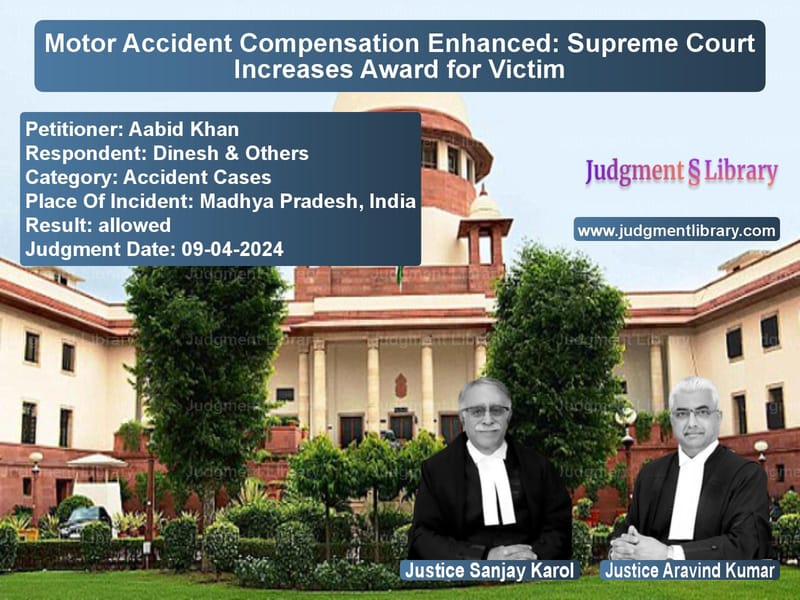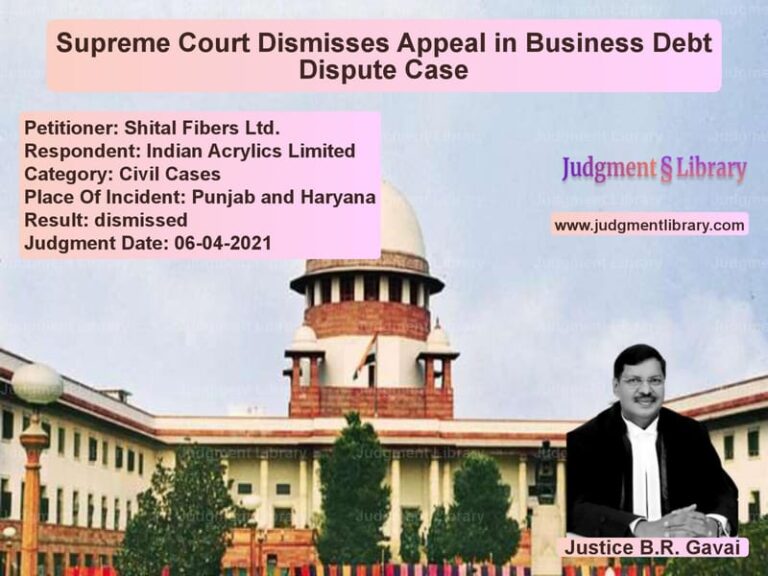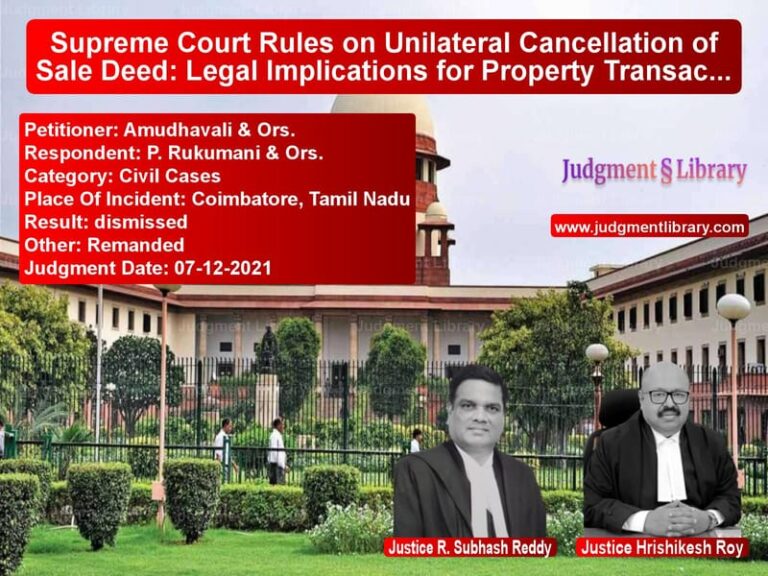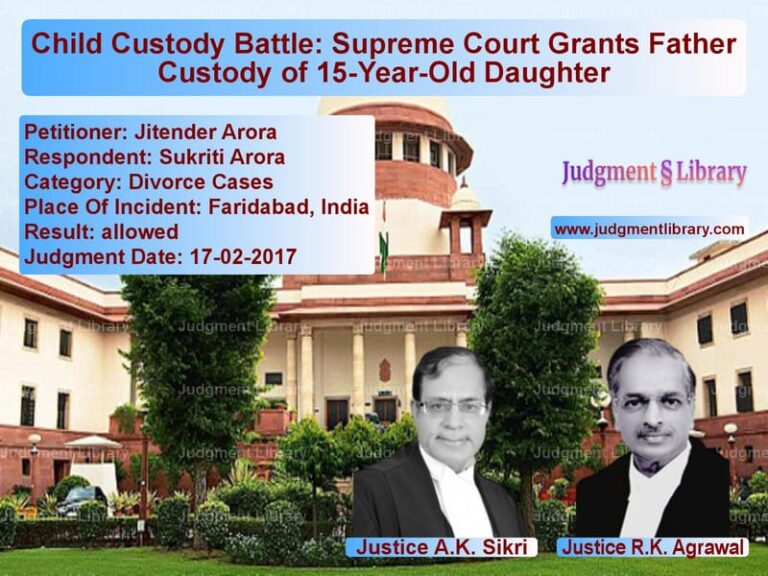Motor Accident Compensation Enhanced: Supreme Court Increases Award for Victim
The Supreme Court of India recently delivered an important judgment in the case of Aabid Khan vs. Dinesh & Others, addressing compensation awarded to a motor accident victim. The case revolved around whether the compensation determined by the Motor Accidents Claims Tribunal (MACT) and later enhanced by the High Court of Madhya Pradesh was adequate given the severity of the injuries suffered by the appellant.
Background of the Case
The accident occurred on April 23, 2013, when Aabid Khan sustained serious injuries in a road accident. He suffered a compound fracture in the left acetabulum (hip bone) and left rib. He later sought compensation under the Motor Vehicles Act for medical expenses, loss of future income, and pain and suffering.
The MACT awarded Rs. 87,700 with interest at 7% per annum. Unhappy with the amount, Khan appealed to the High Court of Madhya Pradesh, which increased the compensation to Rs. 1,27,700. However, Khan remained dissatisfied, arguing that the compensation was still inadequate.
Read also: https://judgmentlibrary.com/supreme-court-enhances-compensation-in-tamil-nadu-road-accident-case/
Legal Issues Considered
The Supreme Court was tasked with determining:
- Whether the High Court’s enhancement was adequate considering the severity of injuries.
- Whether the reduction in disability percentage from 17% to 10% by the lower courts was justified.
- Whether the compensation awarded under various heads, including pain and suffering and loss of income, was appropriate.
Arguments by the Petitioner (Aabid Khan)
- Khan argued that his disability percentage, as determined by his treating doctor (Dr. Alok Mehta, PW-5), was 17% and that the tribunal erred in reducing it to 10% without any medical justification.
- He contended that his monthly income was Rs. 6,500 as a skilled mechanic with 30 years of experience, but the lower courts only considered Rs. 3,500, significantly reducing his future earnings calculation.
- He argued that his pain, suffering, and loss of amenities were not adequately compensated.
Arguments by the Respondents (Insurance Company & Others)
- The insurance company opposed any further enhancement, arguing that the High Court’s increase was fair and reasonable.
- They contended that the tribunal and the High Court had already considered all relevant factors, including disability and earning potential.
- The reduction of disability percentage was justified, as the tribunal had the discretion to assess it based on the evidence presented.
Supreme Court’s Judgment
The Supreme Court enhanced the compensation, ruling in favor of the appellant. It held:
1. Disability Percentage Should Not Have Been Reduced
- The Court held that the tribunal and the High Court erred in reducing the disability percentage from 17% to 10%.
- The Court observed: “Neither the tribunal nor the High Court could have substituted the disability percentage when the doctor (PW-5) had certified it at 17%.”
2. Loss of Future Income Recalculated
- The Court acknowledged that Khan’s monthly income was Rs. 6,500 instead of Rs. 3,500 as determined by the lower courts.
- Using the formula (Income × 12 × Multiplier × Disability Percentage), the Court awarded Rs. 92,820 for loss of future income.
3. Enhanced Compensation for Pain, Suffering, and Other Expenses
- The Court noted that the Rs. 9,000 awarded for pain, suffering, transportation, and attendant charges was “abysmally low.”
- The Court enhanced this amount to Rs. 1,00,000.
4. Final Compensation Awarded
The Supreme Court modified the High Court’s award as follows:
| Particular | Amount (Rs.) |
|---|---|
| Loss of future income due to permanent disability | 92,820 |
| Medical expenses | 49,300 |
| Pain & suffering, attendant charges, and transportation | 1,00,000 |
| Total Compensation | 2,42,120 |
5. Interest on Compensation
- The Court directed the insurance company to pay the enhanced compensation amount with 7% interest per annum.
- The amount was to be deposited with the jurisdictional tribunal within six weeks.
Legal Implications of the Judgment
This ruling strengthens several legal principles:
- Tribunals must respect medical evidence: Courts cannot arbitrarily reduce disability percentages without justification.
- Just compensation must consider economic realities: A claimant’s real income and professional experience should be accounted for.
- Pain and suffering require appropriate compensation: Courts must ensure adequate amounts are awarded for non-economic damages.
- Insurance companies must meet their obligations: Delays in compensation payments cause undue hardship and should be avoided.
Conclusion
The Supreme Court’s decision in Aabid Khan vs. Dinesh & Others ensures that accident victims receive fair compensation based on medical and economic realities. This ruling sets a vital precedent for future motor accident compensation claims, reinforcing the importance of medical opinions, economic considerations, and just assessment of pain and suffering.
Petitioner Name: Aabid Khan.Respondent Name: Dinesh & Others.Judgment By: Justice Sanjay Karol, Justice Aravind Kumar.Place Of Incident: Madhya Pradesh, India.Judgment Date: 09-04-2024.
Don’t miss out on the full details! Download the complete judgment in PDF format below and gain valuable insights instantly!
Download Judgment: aabid-khan-vs-dinesh-&-others-supreme-court-of-india-judgment-dated-09-04-2024.pdf
Directly Download Judgment: Directly download this Judgment
See all petitions in Compensation Disputes
See all petitions in Motor Vehicle Act
See all petitions in Negligence Claims
See all petitions in Judgment by Sanjay Karol
See all petitions in Judgment by Aravind Kumar
See all petitions in allowed
See all petitions in supreme court of India judgments April 2024
See all petitions in 2024 judgments
See all posts in Accident Cases Category
See all allowed petitions in Accident Cases Category
See all Dismissed petitions in Accident Cases Category
See all partially allowed petitions in Accident Cases Category







